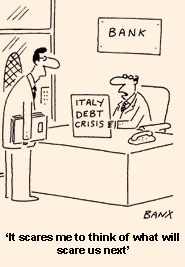Draghi’s cultural initiation test
Roula Khalaf, Editor of the FT, selects her favourite stories in this weekly newsletter.
Saving the euro is one thing. Making the right impression in Frankfurt is quite another.
Mario Draghi, the new European Central Bank president who arrived in Germany’s financial capital last week, might seem a natural fit. He is a smart-dressing, former Goldman Sachs banker, who should feel at home in a city of glass. But Finanzplatz Frankfurt is a conservative place, which has scaled back its international ambitions in recent years. The famously-cautious Bundesbank casts a shadow from its austere concrete headquarters on the city’s northern fringe.
Jean-Claude Trichet, Mr Draghi’s predecessor, added French colour to Frankfurt’s efficient grey tones. He lived in the city’s affluent west end, where he was spotted at weekends in jeans, carrying his shopping in plastic bags or reading newspapers in an Italian restaurant. Mr Trichet patronised the local cultural scene, learnt German and often quoted local boy Johann Wolfgang von Goethe. He also paid tribute to the Bundesbank, boasting how in France he was known as the “Ayatollah of the Franc fort” (strong franc) and a “clone” of Hans Tietmeyer, the former Bundesbank president.
Mr Draghi, it seems, wants to be his own man. Last week he told journalists: “Let me do my work and we will have periodic checks as to whether I am in sync with this tradition.”

The former Italian central bank governor has a reputation as a low-profile operator. But too many weekend trips to Rome would not go down well in Frankfurt. Maybe he could join a golf club, or watch Eintracht Frankfurt football club? His first test will come this month when Frankfurt hosts its European banking congress, a prestigious gathering of the financial elite. Mr Trichet never missed the event; nor did Wim Duisenberg, his predecessor. So far, Mr Draghi has not confirmed his attendance. Will he dare miss it?
Nude and radical
Frankfurt does have a radical edge. It was a hub for 1968ers – the politicised generation born at the end of the second world war. Left-wingers at Frankfurt’s Goethe university saw bankers as their enemy. The city remains a stronghold of the Green party.
Subversive tendencies are still evident in the abuse of the city’s car registration system, which allows owners to choose two letters and up to four digits after an initial “F” on number plates. Popular combinations include “CK” or “UK,” and “KK” as in FKK, or Freikörperkultur, the nudist movement.
Fittingly, Frankfurt is now a hub for Germany’s version of the Occupy Wall Street protests. About 100 tents are pitched on a small park opposite the ECB’s headquarters. A visit reveals a long-haired, bearded man in a yellow jumper washing dishes; other protesters sit cross-legged in a circle at a planning meeting. Saturday marches have attracted thousands – significant numbers for a city of just 700,000. Objects of ire include the ECB because of the sums it spends buying eurozone bonds and refinancing banks.
The Occupy Frankfurt protests have remained orderly. “You can’t really call us radicals,” says Thomas, a retired antiques dealer minding an information stand. “We cut across all sections of the community.” The camp has its own “security and order” tent, required by authorities for the occupation to continue – the five-page agreement is taped on to the stand’s canvas walls. “There has to be somebody to call the fire brigade if a tent catches fire,” explains Thomas.
Since last week, the camp has had running water as well as an electricity generator. Showers have been made available by a nearby bank specialising in ethical investments. “I don’t think Deutsche Bank would allow access to their social areas,” sighs Thomas.
Talking frogs
The ECB is perhaps unfairly the object of Occupy Frankfurt’s scorn. Under Mr Trichet, it fretted about morality and excessive pay in the financial sector. At a private dinner last month in Berlin’s Reichstag, the former ECB president joked about two women who spot a frog in the street. “If you kiss me, I will turn into an investment banker,” says the frog. The first woman scoops up the frog, but puts it in her handbag. The second woman asks: “Why didn’t you kiss it?” The first woman replies: “Because these days a talking frog is more useful than an investment banker.”
Comments